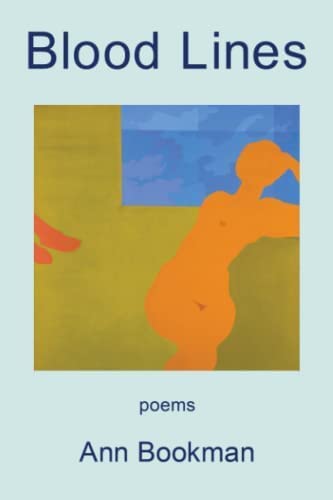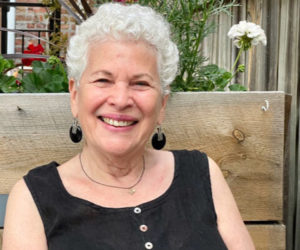Poetry Review: “Blood Lines” — Living into the Dark
By Leigh Rastivo
Presumably, as a policy specialist, Ann Bookman sought to turn ideals into practical reality. Conversely, here in Blood Lines, she unwinds reality to find emotional clarity.
 Blood Lines by Ann Bookman. Kelsay Books, 114 pages, $19.
Blood Lines by Ann Bookman. Kelsay Books, 114 pages, $19.
All personal narratives are perforated — full of facts but also fraught with gaps, unknowns, and secrets. Family histories are the hardest narratives to trace, and notoriously unreliable. Ann Bookman’s second collection of poems, Blood Lines, grapples with this combination of reality and mystery. Through verse interspersed with prose, this book explores the storylines, enigmas, and the very DNA that bind a family together, including a harmful BRCA gene mutation likely to produce hereditary breast–ovarian cancer syndrome in women.
Blood Lines announces the theme of obscured connections straightaway, with the poet dedicating the book to her “foremothers, known and unknown.” The initial epigraph cries out about “true affections” now “scattered.” Next, in just eight lines, with lyrical precision, the first poem, “Migration Routes” likens “personal yet shared” blood with stealth immigration, describing a body colonized by “prophetic genes” transported “across the salt slick ocean” of a bloodstream. The poem ends with the author’s palpable sense of helplessness and resentment at her biological misfortune: “No one applied for entrance to my body.”
Singing at the intersection of tangible and invisible family links, Blood Lines is at once highly specific to one woman — the poet who has inherited the risky BRCA mutation — and communal to all. Bookman is no stranger to the collective needs of women. A Boston-based poet whose first chapbook was published 10 years ago, she is also an anthropologist and a social policy expert on women’s issues. Among other appointments, she served as the director of the Center for Women in Politics and Public Policy at UMass Boston’s McCormack Graduate School until 2018. Presumably, as a policy specialist, Bookman sought to turn ideals into practical reality. Conversely, here in Blood Lines, she unwinds reality to find emotional clarity.
The poems in Blood Lines achieve that emotional clarity best when they employ a concrete image to stand for the murkiness of barely known relatives or invisible concepts, as in “Migration Routes.” Another example: in “White Satin Wedding Slippers,” upon studying a bridal picture of her grandmother Edith, who died at 41 from ovarian cancer, the poet realizes that as a child she unknowingly played dress-up in Edith’s slippers: “I stood before the mirror in my parent’s bedroom… unaware whose shoes I walked in.” Here, history exists despite our ignorance. It does not matter whether the poet knew these people in the flesh or can see that gene mutation. Both endure in her.
The poems in the first section brood over untimely deaths in Bookman’s matriarchal line and interrogate loss: in “Rivka” we hear unanswered questions about a great grandmother who died at 30; and “Reason Why” wants to understand the purpose of “some children [living] motherless.” Loss here is so conflated with connection that the two cannot be parsed. Death does not sever relationship — death is relationship. In “Handmade” the poet tells us she never met her grandmother but nonetheless she knows her grandmother’s face “as [she knows her own] face.” The absence of this matriarch is a mirror, inseparable from both the poet’s sense of self and her experience of family. Death is the touchpoint.
The section II poems dig in and detail death. We hear about surgeries, hospitals, recurrence, and “a cavity—between lung and membrane—filling with fluid.” In “Shaking Steps,” we learn that the poet was on a flight, on her way to visit, at the moment her mother passed away: “my plane landed / she ascended.” Poem after poem — 15 of the section’s 18 — chronicles the cancer battle or its aftermath. It is nearly relentless, with the notable divergence of “Don’t Throw Bouquets” offering a radically different tone and topic. An ode to coming of age as “a child of the 60s,” a feminist “fucking in [the] backseat bedroom,” striving to remain single, this outlier poem jolts the reader, reminding us that the heartbroken daughter was also an animate, sexual, political being. Along with the brooding, there was a life in the world.

Poet Ann Bookman.
The world — especially nature — becomes prominent throughout sections III and IV. The later poems are more grounded in the earth. Several use nature to reflect experience; few now focus directly on the deaths. “Hidden Treasures” finds an apt metaphor for maturity in the “salt marsh decomposing as it flourishes” and fiddler crabs molting “in tunnels of transformation / one body abandoned, another entered.” We also see the poet daring to navigate the “fragile crystals” of a sometimes frozen river, unsure if she should “release [her] weight.” In “Georgica” the poet rides her bike gleefully, describing herself as “a firefly with [her] own light.”
The poems that end this collection reflect a sense of discovery, attempting to assign meaning to the mystery. “I am a bridge unto myself / connecting the divided parts…close to hope” the poet tells us in “Morning Ritual.” We find her “caught off guard / by [her] own power” while “Learning to Float” and sensually romantic in “Constellations” and “Acqua Alta.” In “Simplicity” we hear contentment: “I no longer yearn for an “e” / at the end of my name.” These reconciliations are given satisfying context in the final poem “Hymn to be Sung at Astronomical Twilight,” which comes full circle to answer the resentment expressed in the first poem — not with a counter but with a concession. The very last stanza of Blood Lines hearkens back and embraces that earlier bewilderment, telling us that we must patiently adjust to grief to be consoled:
If you think it’s hard
to make out shapes and sense
from decaying dirt, then wait
till your eyes are used to the dark:
you will see animal hearts and the skins of ghosts
you will see tender shoots and saplings…
With the unending heartache over women gone too soon and the possibility of cancer lurking, Blood Lines traverses a tightrope between destiny and probability, portraying an intimate anxiety that is also universal. These poems do not provide a reprieve from the darkness; rather, they live into the beauty of it.
Leigh Rastivo is a fiction writer, reviewer, and essayist. She was recently accepted at the Under the Volcano international residency where she will present and hone two novels (one literary and one speculative). Leigh’s shorter fiction has been published or is forthcoming in several journals, including the MicroLit Almanac and L’Esprit Literary Review.

